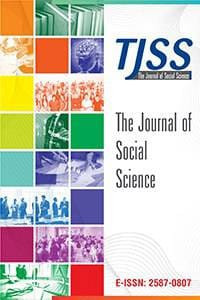KÜRESELLEŞMEDEN GELENEKSELE DÖNÜŞTE SLOW FOOD VE CİTTASLOW HAREKETİ
Cittaslow, Slow Food, Küreselleşme
FROM TRADITION TO GLOBALIZATION: SLOW FOOD AND CITTASLOW MOVEMENTS
Cittaslow, Slow Food, Globalization,
___
- Carp, J., “The Town’s Abuzz: Collaborative Opportunities for Environmental Professionals in the Slow City Movement”, Environmental Practice, 2012/ 14, pp. 130– 142. Cittaslow International Charter (2015a), http://www.cittaslow.org/section/ association/charter, 30.10.2015). Cittslow Intarnational (2015d), Slow Food: Good, Clean and Fair Food for Everyone http://www.cittaslow.org/article/slow-food-good-cleanand-fair-food-foreveryone, 02.02.2015. Coşkun, R. (2002), Küreselleşme: Türkiye Eksenli Analizler, Beta Yayınları, İstanbul. Furze, M., C. Barkhurst, M. C. Childs, “Small Town Sustainability: Economic, Social and Environmental Innovation”, Journal of Urban Design, 2010/15, (3), pp. 449450. Gallagher, A., “Slow Ethics: A Sustainable Approach to Ethical Care Practices?”, Clinical Ethics, 2013/8, (4) pp. 98–104. Grzelak-Kostulska, Elżbieta, B. Hołowiecka And G. Kwiatkowski ) ,“Cittaslow International Network: An Example of a Globalization Idea?”, In The Scale of Globalization. Think Globally, Act Locally, Change Individually in the 21st Century, Ostrava: University of Ostrava, 2011, pp. 186-192.http://conference.osu.eu /globalization/publ2011/186-192_Grzelak-Kostulska-Holowiecka-Kwiatkowski.pdf., 04.04.2015. Gürpınar, E.,(1996), Kent ve Çevre Sorunlarına Bir Bakış, Der Yayınları, İstanbul. Honore, C., (2004), In Praise of Slowness: How a Worldwide Movement Is Challenging the Cult of Speed, San Francisco: Harper San Francisco. Jackson, S. (2007), “The Slow Movement: On The Snails Trail”, www.suejackson.com.au/documents/tsmotst.pdf, 25.03.2015. Jones, P., P. Shears, D. Hillier, vd.,, “Return to traditional values? A case study of slow food”, British Food Journal, 2003/105, (4/5), pp. 297-304. J. Radstrom, S., “A Place Sustaining Framework for Local Urban Identity: An Introduction and History of Cittaslow”, Italian Journal of Planning Practice, 2011/1, (1), pp. 90-113. Tomlinson, J., (2004), Küreselleşme ve Kültür, Ayrıntı Yayınları: İstanbul. Kiper, P., “Küreselleşme Sürecinde Kentlerimize Giren Yeni Tüketim Mekânları ve Yitirilen Kent Kimlikleri” Planlama Tmmob Şehir Plancıları Odası Yayını, 2004/4, (30), 14-18. Knox, P.L., “Creating Ordinary Places: Slow Cities İn A Fast World”, Journal of Urban Design, 2005/10, (1), pp. 1–11. Mayer, H., P.L. Knox, “Slow Cities: Sustainable Places İn A Fast World”, Journal of Urban Affairs, 2006/ 28, (4), pp. 321–334. Mayer, H., P. L. Knox, “Small-Town Sustainability: Prospects İn The Second Modernity”, European Planning Studies, 2010/18, (10), pp. 1545–1565. Miele, M., “CittaSlow: Producing Slowness against the Fast Life”, Space and Polity, 2008/12, (1), pp. 135-156. Nilsson, J. H., A. Svärd, Å. Widarsson, vd.”‘Cittáslow’ Eco-Gastronomic Heritage As A Tool For Destination Development”, Current Issues İn Tourism, 2011/14, (4), pp. 373-386. Parkins, Wendy, G. Craig (2006), Slow Living, New York: Berg Publishers. Petrini, C., (2001), Slow Food: The Case for Taste, New York: Columbia University Press. Pink, S., “Rethinking contemporary activism: From community to emplaced sociality”, Ethnos, 2008a/73, (2), pp. 163–188. Pink, S., “Sense and Sustainability: The Case of the Slow City Movement”, Local Environment, 2008b/13, (2), pp. 95–106. Pink, S., “Urban Social Movements and Small Places, City: Analysis of Urban Trends, Culture, Theory, Policy, Action”, 2009/13, (4), pp.451-465. Ritzer,G., (2011), Toplumun McDonaldlaştırılması, Ayrıntı Yayınları, İstanbul. Sassatelli, R. F. Davolio, “Consumption, Pleasure and Politics: Slow Food and The Politico-Aesthetic Problematization of Food”, Journal of Consumer Culture, 2010/10:202-232. Schneider, S., “Good, Clean, Fair: The Rhetoric of the Slow Food Movement”, Special Focus: Food, 2008/70, (4), 384-402. Slow Food (2012a), Slow Food Internatıonal Statute, Definition And Aims Art. 3 http://www.slowfood.com/filemanager/official_docs/SLOW_FOOD_STATUTE_2012. pdf, 25.02.2015. Slow Food (2012b), Slow Food Internatıonal Statute, http://www.slowfood.com/filemanager/official_docs/SLOW_FOOD_STATUTE_2012. pdf, 25.02.2015. Slow Food International (2013), About Us, Good, Clean And Fair Food,http://www.slowfood.com/international/1/about-us, 14.11.2014. Slow Food International (2015a), Taste And Food Education, http://www.slowfood.com/international/12/food-and-taste-education, 18.01.2015. Slow Food International (2015b), The Slow Food Manifesto, http://www.slowfood.com/filemanager/Convivium%20Leader%20Area/Manifesto_EN G.pdf, 16.02.2015. Slow Food Manifesto For Quality (2010), http://slowfood.com/_2010_pagine/ com/popup_pagina.lasso?-id_pg=122.,29.10.2014. Tencati, A., L. Zsolnai, “Collaborative Enterprise and Sustainability: The Case of Slow Food”, J Bus Ethics, 2012/110, pp. 345–354.
- Yayın Aralığı: Yılda 2 Sayı
- Başlangıç: 2017
- Yayıncı: Cenk AKSOY
KÜRESELLEŞMEDEN GELENEKSELE DÖNÜŞTE SLOW FOOD VE CİTTASLOW HAREKETİ
MAĞAZA ATMOSFERİNİN TÜKETİCİ TERCİHİNDEKİ ÖNEMİ
BANKA SEÇİMİNDE MÜŞTERİ TERCİHLERİ: KATILIM BANKALARI ÜZERİNE AMPRİK BİR İNCELEME
İsmail DURAK, Murat BAYAT, Hakan Murat ARSLAN
TOPLUMSAL CİNSİYET EŞİTSİZLİĞİ ÜZERİNDE YAZILI BASINDA KADIN TEMSİLİNİN ROLÜ
